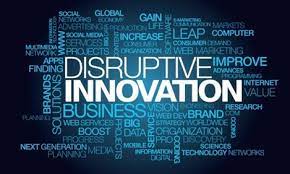
Yes! The next decade will be shared by four (4) business models. The Previously independent waves of
exponentially accelerating technology are starting to
converge with other independently accelerating waves
of technology.
In other words, these waves are beginning to converge,
building on top of one another and threatening to
annihilate nearly every business in their path.
The rate of medication development, for example, is increasing. Not just because biotechnology
(sequencing, CRISPR, and other exponentials) is advancing at an exponential rate, but also because AI,
quantum computing and other exponentials are convergent on the field.
The term “disruptive innovation” refers to an innovation that establishes a new market while destroying an existing one.
For example, at the dawn of the digital age, silicon chips replaced vacuum tubes. That was a game-changing breakthrough.
Solitary exponentials, like when Netflix ate Blockbuster for lunch, upset products, services, and markets, whereas convergent exponentials sweep away products, services, and markets, as well as the structures that support them.
There is no industry that is unaffected.
Being able to see around the corner of tomorrow and being agile enough to react is important to your success as an entrepreneur.
In today’s post, I’ll discuss four (4) developing business models (based on convergent technologies) that will reshape the industry in the coming decades.
Let’s get started…
THE NEXT DECADE WILL BE SHARED BY FOUR BUSINESS MODELS
As you go through these business concepts and the accompanying examples, consider how you may apply them to your own success.
(1) The Crowd Economy:
Crowdsourcing, crowdfunding, leveraged assets, and staff-on-demand are all trends that take advantage of the billions of people who are presently online and the billions who will be online in the near future.
For example, Airbnb has grown to become the world’s largest “hotel chain,” despite not owning a single hotel room. Instead, it leverages (that is, rents out) the crowd’s assets (spare bedrooms), which total over 5 million rooms, flats, and houses in over 100,000 places worldwide.
(2) The Smartness Economy:
Back in the late 1800s, all you needed was a decent idea for a new enterprise.
But today AI will be the electricity in the 2020s.
To put it another way, take any existing tool and add a layer of intelligence.
For example, we’ve all heard of huge companies like Amazon and Salesforce implementing AI into their
business processes. Every day, though, new AI firms emerge:
In 2021, 2,300 AI-related startups raised moreover $70 billion globally, more than doubling the amount
raised in 2020.
(3) Decentralized Autonomous Organizations (DAOs):
At the intersection of blockchain and AI, a new type of organization has emerged. One in which there are
no employees, no supervisors, and continuous production. The company’s operations are determined
by a set of preprogrammed rules, and computers handle the rest.
While DAOs are still in their infancy, the platform DAOstack is aiming to provide them with the tools they
need to succeed.
For example, a fleet of self-driving taxis with a blockchain-backed smart contracts layer might
operate 24 hours a day, seven days a week, without the need for human intervention, even going
to the repair shop for maintenance.
(4) Metaverse: We no longer exist in a single location.
We have offline and online personae, and this delocalized life will continue to grow. We’re adding more
layers to this equation with the emergence of Augmented Reality and Virtual Reality. You’ll have professional avatars and personal avatars. You’ll have work avatars and play avatars, and all of these versions of ourselves are fresh business prospects.
For instance, we have all mastered Zoom today.
Tomorrow, we’ll be digging deep into the SpatialWeb, navigating the Metaverse using technologies like Vatoms (virtual atoms) and SpatialWeb.net to go back and forth between many virtual worlds and our physical reality.
FINAL CONCLUSIONS
When considering how to take advantage of these new business models, keep in mind that the rate at
which technology advances is also increasing.
Despite this shifting environment, many firms are still grounded by a maintenance mentality, competing primarily on operational execution.
However, as an entrepreneur, law firm business owner, using these business models for success is more
important than ever.
Regards,
Cued from
Peter Demandis


